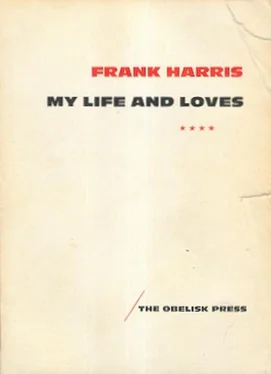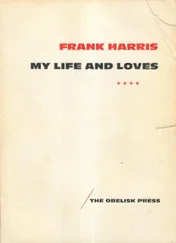Frank Harris - My Life And Loves, vol 5
Здесь есть возможность читать онлайн «Frank Harris - My Life And Loves, vol 5» весь текст электронной книги совершенно бесплатно (целиком полную версию без сокращений). В некоторых случаях можно слушать аудио, скачать через торрент в формате fb2 и присутствует краткое содержание. Жанр: Эротика, Секс, на английском языке. Описание произведения, (предисловие) а так же отзывы посетителей доступны на портале библиотеки ЛибКат.
- Название:My Life And Loves, vol 5
- Автор:
- Жанр:
- Год:неизвестен
- ISBN:нет данных
- Рейтинг книги:3 / 5. Голосов: 1
-
Избранное:Добавить в избранное
- Отзывы:
-
Ваша оценка:
- 60
- 1
- 2
- 3
- 4
- 5
My Life And Loves, vol 5: краткое содержание, описание и аннотация
Предлагаем к чтению аннотацию, описание, краткое содержание или предисловие (зависит от того, что написал сам автор книги «My Life And Loves, vol 5»). Если вы не нашли необходимую информацию о книге — напишите в комментариях, мы постараемся отыскать её.
My Life And Loves, vol 5 — читать онлайн бесплатно полную книгу (весь текст) целиком
Ниже представлен текст книги, разбитый по страницам. Система сохранения места последней прочитанной страницы, позволяет с удобством читать онлайн бесплатно книгу «My Life And Loves, vol 5», без необходимости каждый раз заново искать на чём Вы остановились. Поставьте закладку, и сможете в любой момент перейти на страницу, на которой закончили чтение.
Интервал:
Закладка:
Dying, Rhodes reached his true height. “Everything in the world is too short,” he said one day, “life and fame and achievements, everything is too short.” Just before his death on March 26, 1902, he was heard to say: “So little done, so much to do.” It might well be his epitaph.
I feel that I ought to tell something about Rhodes' greatest rival, Paul Kruger, the President of the Transvaal, though in statecraft he was no match for Rhodes. It was said that when a young man, he was the greatest athlete in the country. He was just six feet in height and was, it was said, an extraordinary runner, and possessed, besides, extraordinary strength.
It was Sir James Sivewright who told me that on one occasion Kruger ran a footrace against the pick of Kaffir braves. There were large prizes of good cattle. It was a long day's run across country past certain well-known landmarksamongst others, his own father's house. Young Kruger soon distanced all his pursuers, and when he reached his father's house, he was so far ahead that he went in and had some coffee. His father, however, was so angry with him for running across country without his rifle that he very nearly gave his son a flogging. He made the boy take a light rifle with him when he left to finish his race.
On sped young Kruger, the Kaffir braves toiling after him as well as they could. They threw away their impediments as their muscles weakened; their path became strewn with shields, spears, clubs, and even the bangles they wore on their legs and arms. But in spite of it all, Paul Kruger kept far ahead of them.
His speed on foot was so extraordinary that it was commonly said that he could outrun a horse, and I believe that on one occasion he did. Of course, the myth faculty came into play, and it was usually said that Kruger ran faster than a horse can gallop for half a mile, which, was utterly impossible. In truth, over twelve hours he did, I believe, surpass a horse.
Another story equally strange was told me. Kruger had been chasing buffalo, and his horse had brought him close up to his victim. Suddenly the huge beast put his foot into a hole, and fell head-over-heels into a swamp. Kruger was on top of it in a moment, horse, rider and buffalo all rolling pell-mell in the same soft ground. Kruger was the first to collect his wits. He sprang at the head of the buffalo, seized both its horns in his hands, and while the beast lay upon its side, twisted its neck so as to force its nose under water; thus, after a struggle, Kruger killed the buffalo, drowning it by sheer strength. I had heard this story already in Cape Town, but would not believe it until I had the President's corroboration of this extraordinary feat.
It was the same Sivewright, the Minister of Public Works in the Cape Colony, who told me that he once called upon Kruger with a certain English duke, who was by no means conceited, but was somewhat deficient in diplomacy. The conversation, as I recall it, ran about as follows. Of course it was conducted by means of an interpreter.
“Tell the President that I am the Duke and have come to pay my respects to him.”
Kruger gave a grunt signifying welcome.
“Tell him that I am a member of the English Parliament,” said the Duke after a long pause.
Kruger gave another grunt, puffing his pipe.
After a still longer pause: “Andyou might tell him that I amera member of the House of Lordsa Lordyou know.”
Kruger puffed as before, and nodded his head, with another grunt. Then, turning, he said gruffly, “Tell the Englishman that I was a cattle-herder.”
There was no snobbishness in Kruger, but he possessed great obstinacy and he was as combative as a bull-terrier. I told him that he had better give in to Chamberlain, and give the Englishman the pride of a victory in words, “or else,” I said, “you may be sure there will be war, which will help no one.”
Kruger said: “You may be right, but the issue is in the hands of God. I can only do what I regard as right, and the issue is not so certain as you think. We Boers are hard to beat.” He afterwards sent for me saying that I was the only Englishman he had met who told him the truth. It would have been easy for Chamberlain to manage Kruger, as it was easy for Kruger to placate Chamberlain. But, alas! they preferred to fight, and I cannot but admit that the chief wrong was Chamberlain's. The consciousness of power leads usually to provocative bullying. The struggle cost poor Kruger his life.
My proof that the South African War had cost Great Britain millions and had worsened our relations with South Africa made me many enemies in England. All the evil effects of the war had seldom been adequately or carefully stated. Let me give here some new facts.
In 1901, the Commission of Police in London reported that in the twelve months during which Lord Kitchener was looting and burning and devastating South Africa, the criminal classes were carrying on similar operations in the heart of the Empire. In a single twelve months, burglaries in London rose 50 per cent. Forgeries also showed a similar increase; house-breaking rose 22 per cent, and shop-breaking 15 per cent. As with crime, so with drunkenness. The number of convictions for drunkenness in the five years from 1897 to 1901 showed an increase of 50 per cent in London over the convictions for the five years from 1892 to 1896. The increase in vagrancy was even more appalling. In 1901 the number of vagrants relieved at the workhouse showed an increase of 20 per cent, and in 1901 the number was actually 100 per cent higher than the figure at which it stood ten years before.
The tide of pauperism, which had been steadily ebbing during the liberal regime of peace, turned completely. In 1900 there was 1 pauper for 42 of the population, in 1901 1 in 40, and in November 1902, 1 in 38.4. Not less ominous was the tale told in the Labor Gazette as to the increase in the number of unemployed. When the war began, the percentage reported as unemployed by the trades unions was little more than 2.5. In November 1902, the percentage had doubled. The poverty in England chiefly due to the English ruling classes was intensified through this purposeless war. Here I will use another authority:
In 1904, Montague Crackenthorpe in an article in The Nineteenth Century gave some figures which deserve to be widely known. He proved that “nine hundred and twenty-nine out of every thousand persons in the Kingdom die in poverty and one of every four in London dies supported by public charity. Eight millions of people in the United Kingdom are on the edge of starvation, and twenty millions are not comfortable.”
Such facts should be known to every man, but not one Englishman in ten thousand cares to note them, and not one in ten million attempts to understand their profound significance, much less dream of a remedy.
Perhaps the worst of all is Crackenthorpe's true statement: “The people of England have come to look on starvation and suffering, which they call distress, as part of the social order. Chronic starvation is regarded as a matter of course.”
I cannot help adding a table showing the cost of armaments in each of these first years of the century:
France?38,400,000
Germany?38,000,000
United States?38,300,000
Russia?43,000,000
Italy?15,700,000
Great Britain spent?69,000,000
The South African war was made by England and it was well perhaps that she should pay for it; but the wrongs she committed in South Africa were beyond belief.
In the South African war, Chamberlain made the mistake of choosing the worst possible Lieutenant. Lord Milner was all for fighting until the Boers surrendered unconditionally. He armed scores of thousands of blacks. He closed the gates of the refugee camps against the miserable women and children whose homes he had burned and let loose his armed savages upon the helpless wanderers. A little further pressure and these methods of barbarism would, he believed, result in unconditional surrender.
Читать дальшеИнтервал:
Закладка:
Похожие книги на «My Life And Loves, vol 5»
Представляем Вашему вниманию похожие книги на «My Life And Loves, vol 5» списком для выбора. Мы отобрали схожую по названию и смыслу литературу в надежде предоставить читателям больше вариантов отыскать новые, интересные, ещё непрочитанные произведения.
Обсуждение, отзывы о книге «My Life And Loves, vol 5» и просто собственные мнения читателей. Оставьте ваши комментарии, напишите, что Вы думаете о произведении, его смысле или главных героях. Укажите что конкретно понравилось, а что нет, и почему Вы так считаете.






![William Frith - John Leech, His Life and Work. Vol. 1 [of 2]](/books/747171/william-frith-john-leech-his-life-and-work-vol-thumb.webp)
![William Frith - John Leech, His Life and Work, Vol. 2 [of 2]](/books/748201/william-frith-john-leech-his-life-and-work-vol-thumb.webp)




